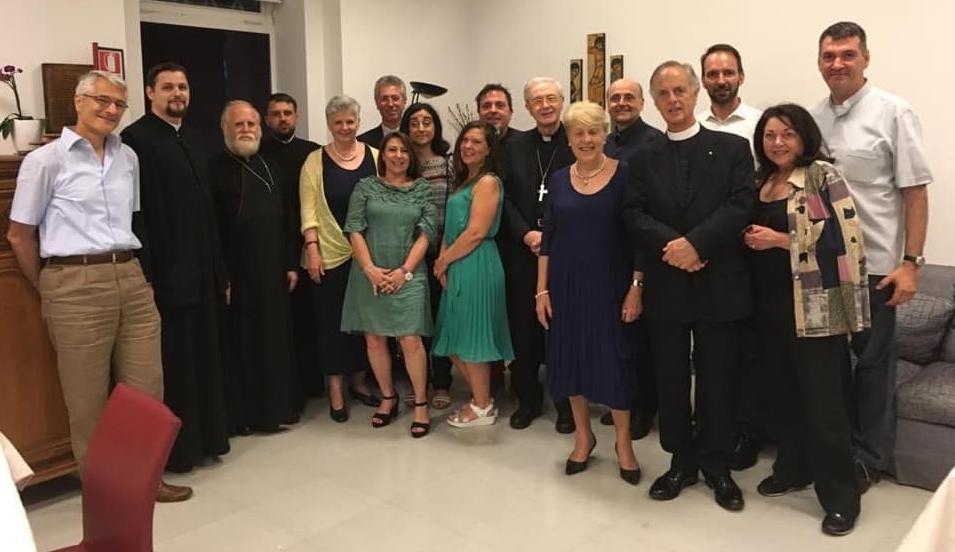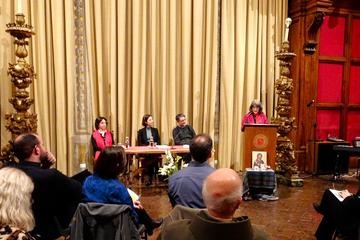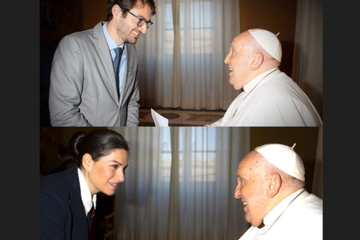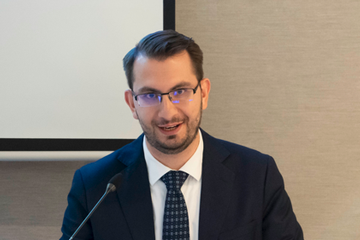
By Elena Dini
ROME— Msgr Marco Gnavi is the pastor of the Basilica of Santa Maria in Trastevere and serves on the international leadership team of the St Egidio Community. He is also the director of the Diocese of Rome’s Office for Ecumenism, Interreligious Dialogue and New Cults. In this role, he directs an Ecumenical Commission, which holds meetings monthly. In recent years, these meetings have been held at The Lay Centre, whose director, Donna Orsuto, is an Ecumenical Commission member.
Who takes part in the Diocesan Ecumenical Commission and what is its goal?
The Ecumenical Commission of the Vicariate of Rome is composed of parish priests, pastoral officers, chaplains, representatives of the union of national superiors general and other members who are part of the diocese and live ecumenism as part of the everyday life of parishes, movements and associations of believers. The commission’s goal is to sustain the desire for Christian unity and interreligious dialogue, as well as to favour brotherly relations, fully respecting of each participant’s identity. This is a mission dear to Pope Francis’ heart and, since we are the Diocese of Rome, we feel particularly the responsibility to respond to it as much as we can. Furthermore, all Christian churches are represented in Rome, as well as many world religions, and this allows us to engage on a regular basis with our brothers and sisters of different communities.
Investing in relationships looks like a key element of your action…
Yes. In our globalized world where relations are considered fluid, we rediscover a great richness in brotherly relationships. In this regard, the documents of the Second Vatican Council are our compass.
In hospitals and prisons, as well as on the streets, people in need of support are Catholics but also Christians of other churches and believers of other faith traditions. We are called to globalize love and to be a witness through prayer, closeness to the poor, commitment to peace and charity, and engagement for unity among Christians and unity among the human family.
The relationship with the Jewish community is a special one. The Commission for Religious Relations with the Jews is indeed one of the commissions of the Pontifical Council for Christian Unity and not of the Pontifical Council for Interreligious Dialogue. Could you tell us more about it in the local context of Rome?
Indeed, relations with the Jewish community in Rome has its own peculiarity. We live a close spiritual connection, but, at the same time, the history of the Jewish community that has been living in this city for two millennia, unfortunately, carries profound wounds. We recently remembered the sad anniversary of Oct 16, 1943, when 1,022 Roman Jews were deported to Auschwitz.
The Second Vatican Council represented a milestone in the relationship between Catholics and Jews, and from there we move forward.
The progressive disappearance of witnesses to the Holocaust demands from us a greater responsibility toward younger generations, not only to keep memory alive but to live our present and to prepare a better future together. We owe that to the victims of all anti-Semitic action. In this time in which it seems that the most convincing identities are those establishing themselves against others — and acts of antisemitism seem to have returned in some countries and in Italy, too — our mission becomes increasingly important.
What about the relationship with Muslim communities?
In Rome, we have the Great Mosque but there are also many other mosques and halls of prayers in the outskirts. We need to work on establishing relationships and helping younger generations not to look at each other with suspicion but to get closer.
The recent document signed by Pope Francis and the Grand Imam of Al-Azhar on human fraternity shows a dialogue that enters the everyday life of people: dialogue is related to life and cannot but lead to peace.
What concrete actions are carried out in the diocese under the umbrella of the Diocesan Ecumenical Commission?
The commission supports formation, facilitates concrete encounters, and is present at important and traditional events, such as the Week of Prayer for Christian Unity and the prayer usually organized around Pentecost. A couple of times per year we organize a visit with parish priests to one of the mosques in the suburbs. Another experience we support is the formation of ecumenical animators, who are lay people who want to favour dialogue in their parishes and receive formation about other Christian denominations through lived experience.
Ecumenism, as well as interreligious dialogue, have to become concrete in people’s everyday life and exit from the experts’ circle. Shortcuts make us believe that we know who the other is, such as through slogans, which, at the end of the day, pit us against the other. Instead, getting to know each other is a longer and deeper process. With this in view, we developed initiatives, such as meetings between parish priests and local imams.
We should not forget that in Rome there are many parishes, movements, centres for dialogue, as well as the pontifical councils for Christian unity and interreligious dialogue. The commission is here to connect and walk together with all these different bodies and institutions while enjoying their richness.
The commission often meets at The Lay Centre. How can this place support your endeavours?
We enjoy and are grateful about the hospitality we receive here at The Lay Centre. This place is so appropriate for hosting our meetings, considering its mission and its being an example of dialogue and ecumenism in itself. The students who are part of the resident community are in a positive and supportive environment to pursue their studies, as well as to live the rich diversity and create relationships. The Lay Centre is a living bridge for them, connecting different experiences without watering down identity. I’m sure that this is an important part of what these students will bring back to their home countries or where they will live.
The Lay Centre represents an opportunity and a richness, and we hope it will be increasingly a visible sign within the City of Rome.


